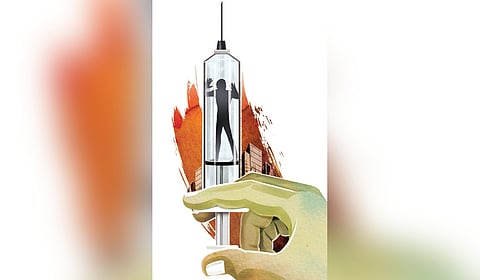

KOCHI: Kerala is witnessing a disturbing trend as the number of crimes committed under the influence of drugs and alcohol continues to rise sharply. In 2024 alone, the state has seen a more than 120% increase in criminal cases involving intoxicated individuals.
In January, a 53-year-old woman was hacked to death by her son, Ashiq, 24, in Thamarassery. Ashiq was a known drug addict. Last month, in Engapuzha, Kozhikode, a 25-year-old man under the influence of drugs brutally murdered his wife.
In another case, a 35-year-old attacked his elderly parents in Tanur, Malappuram, after they refused to give him money to buy drugs. These incidents are no longer isolated.
In 2024 alone, 88 criminal cases, including murder, rape, attempted murder, and assault, committed under the influence of drugs or alcohol have been reported. In contrast, there were 37 such cases in 2023, 28 in 2022, and just 16 in 2021. Between January and March 15 this year, 23 cases have already been recorded.
Renowned criminologist James Vadackumcherry believes the actual number of such incidents is much higher, as many cases remain within the confines of the family and go unreported.
“Son attacking parents, husband assaulting wife, these cases are often hidden behind closed doors. They only come to light when grave crimes occur,” James said.
According to James, there is a clear link between the rise in drug and alcohol abuse and these violent incidents, especially among youngsters.
The government must take proactive measures to curb drug trafficking and substance abuse, he said. Dr Arun B Nair, professor of psychiatry at Thiruvananthapuram Medical College, pointed out that the surge in crime and drug abuse among youth are linked to social isolation, impulsive behaviour, and improper parenting.
“Youngsters today are more isolated and impulsive. In such a state, drug abuse becomes the final trigger. Drugs impair the prefrontal cortex - the part of the brain responsible for decision-making and social behaviour - leading to violent reactions in adverse situations,” he explained.
According to him, with access to overwhelming information from multiple platforms, today’s youth are losing their ability to think critically. This often results in a dismissive attitude toward parents. To combat the crisis, Arun suggests the need for imparting early education to both children and parents.
“Reducing demand is key. We need to start training children from a young age. Life skills education that teaches resilience and emotional regulation must be incorporated into school curriculums. Though a curriculum was drafted, it needs to be implemented without delay. Identifying and nurturing each child’s talents is crucial. Parents, too, should be part of this process - schools must ensure that fathers, in particular, attend PTA training sessions.”
Arun also highlighted the importance of extracurricular activities in crime prevention. “Encouraging participation in sports and cultural events is vital. Studies show that sports helps reduce digital and drug addictions. Schools must revive defunct clubs and actively promote student involvement based on their interests and abilities,” he added.